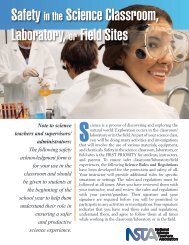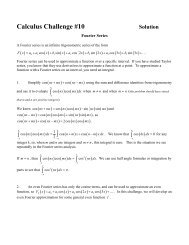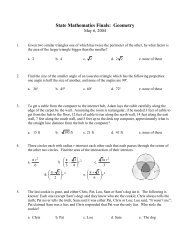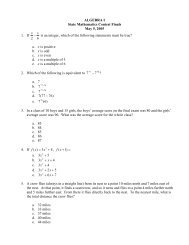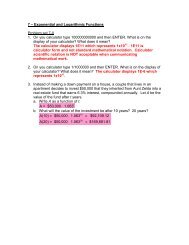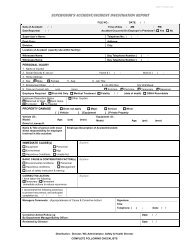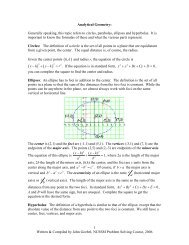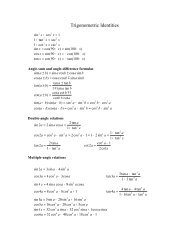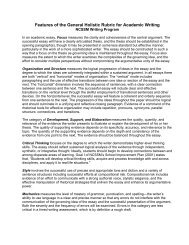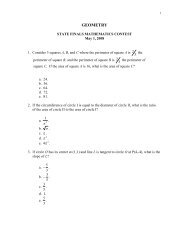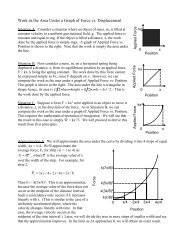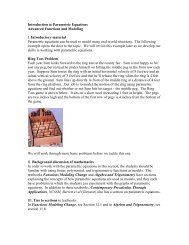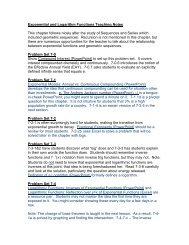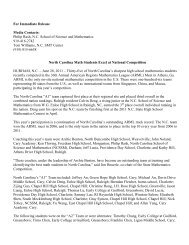NCSSM COURSE CAtAlOG - North Carolina School of Science and ...
NCSSM COURSE CAtAlOG - North Carolina School of Science and ...
NCSSM COURSE CAtAlOG - North Carolina School of Science and ...
Create successful ePaper yourself
Turn your PDF publications into a flip-book with our unique Google optimized e-Paper software.
Meeting pattern: Four periods per week including lab.<br />
This course provides a thorough treatment <strong>of</strong> classical mechanics up to, but not<br />
including, angular momentum. Calculus is used where needed <strong>and</strong> is treated at<br />
a level appropriate to students who are taking MA420 or higher-level calculus<br />
course. An excellent grasp <strong>of</strong> the fundamental concepts taught in introductory<br />
physics is assumed. There is a strong problem-solving emphasis <strong>and</strong> the course<br />
includes a lab component. Students who have taken PH307 will find it necessary<br />
to study some additional topics not taught in those courses. This course may be<br />
used to prepare for the Mechanics portion <strong>of</strong> the AP C Physics examination, but<br />
its breadth <strong>and</strong> depth are significantly higher than that <strong>of</strong> a typical AP C Physics<br />
course.<br />
PH406 AP Physics C: Mechanics (II)/Electricity <strong>and</strong> Magnetism (I)<br />
One trimester<br />
Credit: One unit core physics or core elective credit.<br />
Prerequisite: Final grade <strong>of</strong> B or higher in PH404 AP Physics C: Mechanics (I), <strong>and</strong><br />
permission <strong>of</strong> the Dean <strong>of</strong> <strong>Science</strong>.<br />
Corequisite: MA422 AP Calculus BC (Advanced Topics II).<br />
Meeting pattern: Four periods per week including lab.<br />
This course provides the completion <strong>of</strong> classical mechanics (in particular, the<br />
study <strong>of</strong> angular momentum <strong>and</strong> <strong>of</strong> gravitational fields) <strong>and</strong> an introduction to<br />
electronic forces <strong>and</strong> fields, Gauss’ law, capacitance, <strong>and</strong> voltage. Calculus is<br />
used where needed <strong>and</strong> is treated at a level appropriate to students who are<br />
taking MA422 AP Calculus BC (Advanced Topics II). Completion <strong>of</strong> PH404 <strong>and</strong><br />
this course may be used to prepare for the Mechanics portion <strong>of</strong> the AP C<br />
Physics examination, but its breadth <strong>and</strong> depth are significantly higher than that<br />
<strong>of</strong> a typical AP C Physics course.<br />
PH408 AP Physics C: Electricity <strong>and</strong> Magnetism (II)<br />
One trimester<br />
Credit: One unit core physics or core elective credit.<br />
Prerequisite: Final grade <strong>of</strong> B or higher in PH406 AP Physics C: Mechanics<br />
(II)/Electricity <strong>and</strong> Magnetism (I), MA422 AP Calculus BC (III) <strong>and</strong> permission <strong>of</strong><br />
the Dean <strong>of</strong> <strong>Science</strong>.<br />
Meeting pattern: Four periods per week including lab.<br />
This course continues the study <strong>of</strong> electromagnetism. Topics include electric<br />
circuits (R, RC, <strong>and</strong> RL), magnetism, Ampere’s law, induction, <strong>and</strong> the<br />
Faraday/Lenz law. Emphasis is on the completion <strong>of</strong> the AP C Physics<br />
curriculum. Topics in geometrical <strong>and</strong> physical optics are <strong>of</strong>fered after the<br />
completion <strong>of</strong> the AP syllabus. There is a strong problem-solving emphasis <strong>and</strong><br />
the course includes a lab component. Calculus is used where needed <strong>and</strong> is<br />
77



